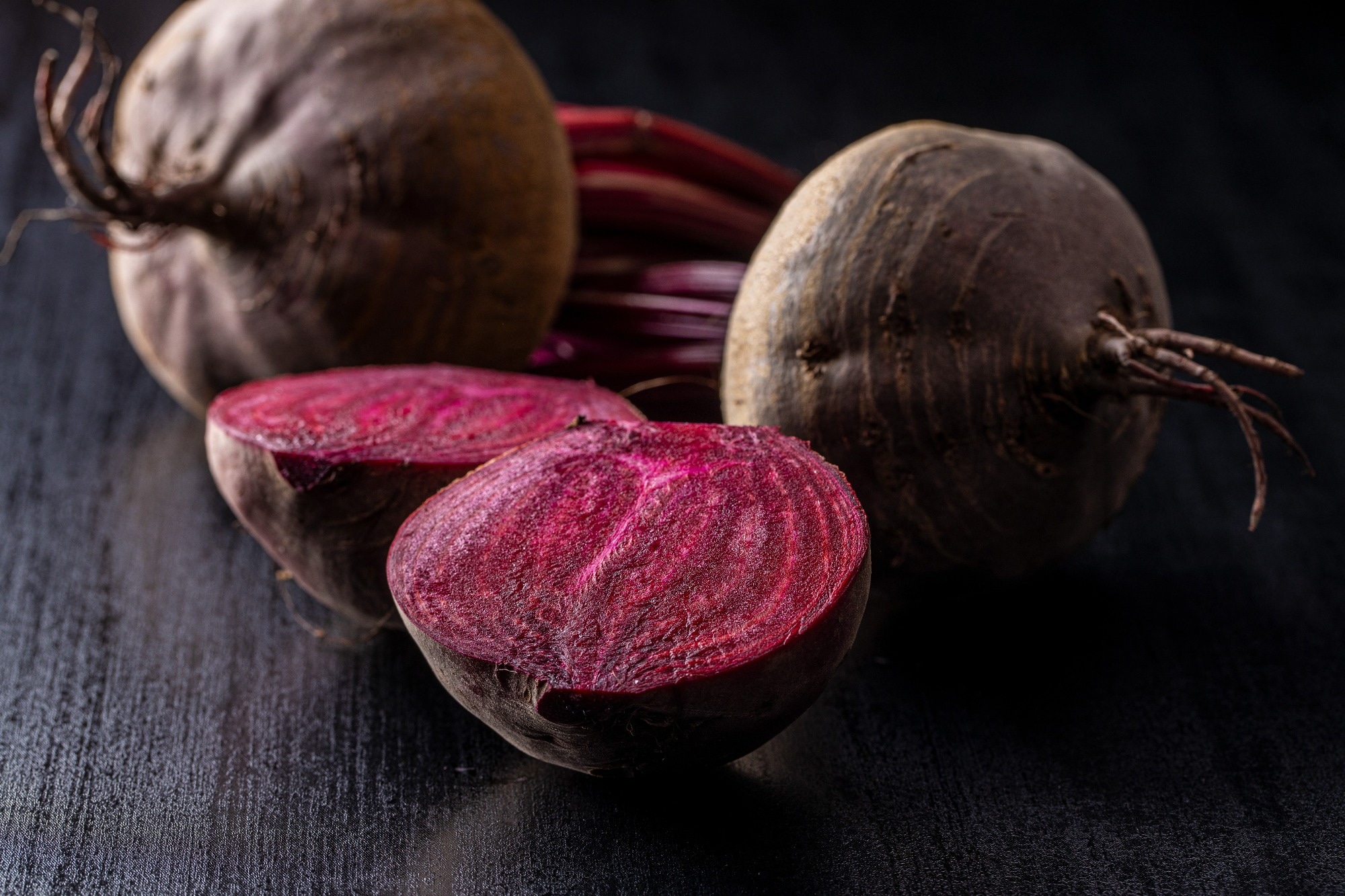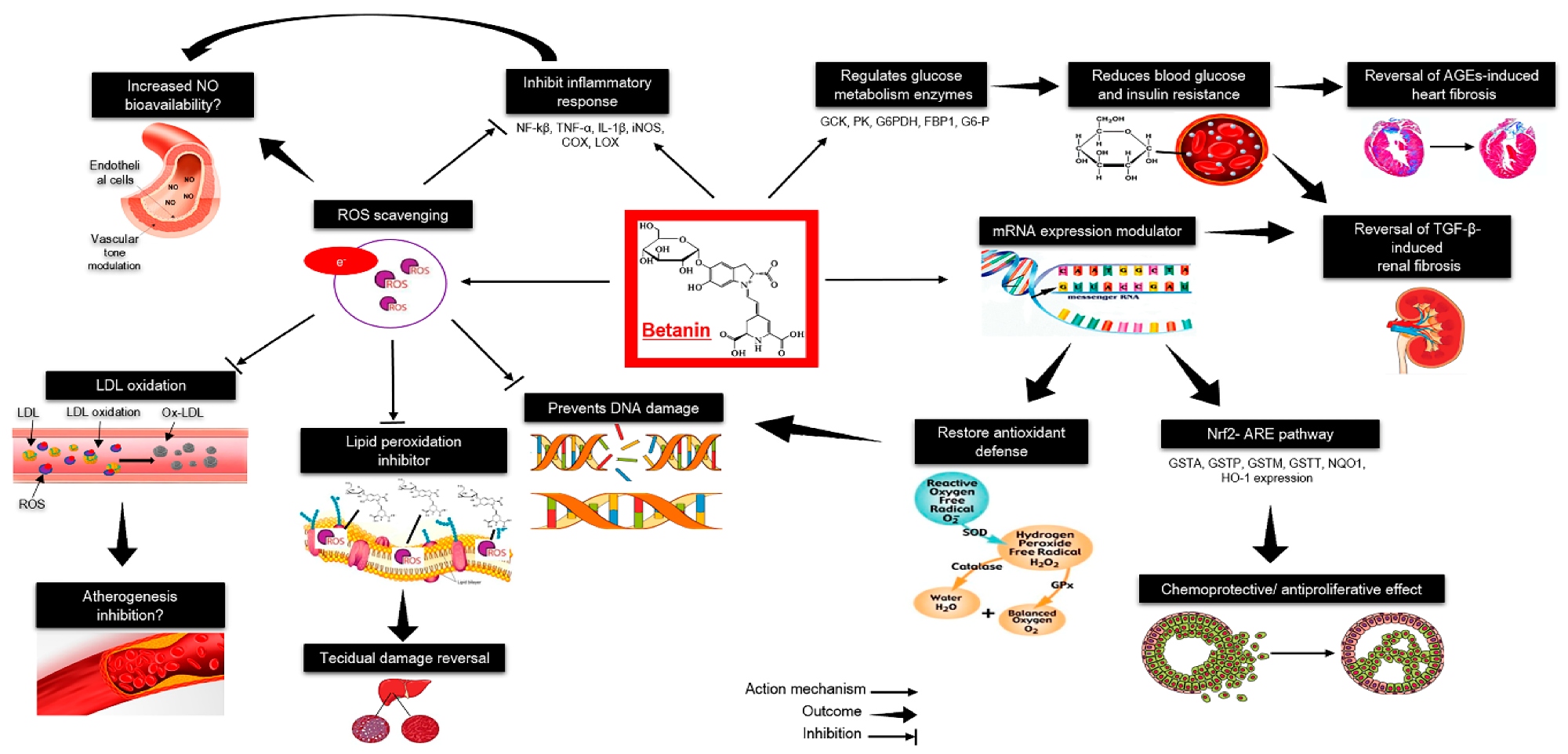Introduction
Phytochemical composition of beetroot
NO and vascular function
Effects on blood flow and exercise performance
Clinical potential in cardiovascular and metabolic disorders
Dosing, safety, and bioavailability considerations
Conclusions
References
Further reading
Beetroot is a nutrient-rich food filled with nitrates and phytochemicals that promote cardiovascular health, enhance exercise performance, and support metabolic balance via nitric oxide pathways. Research underscores its potential as a safe supplement for managing hypertension, diabetes, and vascular health.
 Beetroot (Beta vulgaris). Image Credit: Hiri Hera / Shutterstock.com
Beetroot (Beta vulgaris). Image Credit: Hiri Hera / Shutterstock.com
Introduction
Beetroot (Beta vulgaris) has emerged as a versatile functional food, rich in betalains, polyphenols, vitamins, minerals, and naturally occurring nitrate that confer antioxidant and anti-inflammatory effects. Recently, beetroot juice or concentrates have been linked to improved endothelial function, reduced blood pressure (BP), and enhanced exercise tolerance, all of which are effects implicated in the enterosalivary nitrate-nitrite-nitric oxide (NO) pathway, which augments vasodilation and tissue oxygen delivery.1
Phytochemical composition of beetroot
Nitrate absorbed from beetroot enters the enterosalivary circuit, where oral bacteria reduce it to nitrite. In the acidic stomach and hypoxic tissues, nitrite is further reduced to NO, a vasodilator that improves endothelial function and lowers BP.
Beetroot also supplies a diverse array of polyphenols, including gallic, caffeic, chlorogenic, and ferulic acids, which activate endogenous cytoprotective pathways and mitigate oxidative stress. Betalains, dominated by betanin, are similarly potent antioxidants and radical scavengers, with a free-radical-quenching capacity reported to rival or exceed that of several anthocyanins.1,2
Together, betalains and polyphenols preserve NO bioavailability by preventing the production of reactive oxygen species (ROS) that would otherwise quench NO or its precursors. Previously, beetroot formulations that combine effective nitrate doses with betalain- and polyphenol-rich matrices have been shown to optimize NO generation and hemodynamic benefits while supporting adherence.
Beetroot also provides carotenoids, flavonoids, saponins, and dietary fiber in addition to micronutrients such as folate, potassium, magnesium, iron, and zinc. Vitamin C and organic acids present in beetroot chelate pro-oxidant metals and support collagen and vascular integrity, thereby protecting NO signaling from oxidative inactivation during transport and tissue delivery.1,2
While inorganic nitrate is highly bioavailable (close to 100% absorption), betalains show low but measurable bioavailability (0.3–0.9%), with high inter-individual variability.6

Health effects of betanin: A summary of molecular and metabolic targets of betanin reported in cell cultures and animal models. AGEs, advanced glycation end products; C, carbon; COX, cyclooxygenase; DNA, deoxyribonucleic acid; FBP1, fructose-bisphosphatase 1; G6-P, glucose 6-phosphate; G6PDH, glucose-6-phosphate dehydrogenase; GCK, glucokinase; GPx, glutathione peroxidase; GSTA, glutathione S-transferases A; GSTM, glutathione S-transferases M; GSTP, glutathione S-transferases P; GSTT, glutathione S-transferases T; H, hydrogen; H2O2, hydrogen peroxide; IL-1β, interleukin 1 beta; HO-1, heme oxygenase-1; iNOS, inducible nitric oxide synthase; LDL, low-density lipoprotein; LOX; lipoxygenase; mRNA, messenger ribonucleic acid; N, nitrogen; NF-Κβ, nuclear factor kappa beta; NQO1, quinone dehydrogenase 1; NO, nitric oxide; Nrf2-ARE, nuclear factor erythroid 2-antioxidant responsive element; O, oxygen; O2•−, superoxide anion; OH, hydroxyl radical; Ox-LDL, oxidized low-density lipoprotein; PK, pyruvate kinase; ROS, reactive oxygen species; SOD, superoxide dismutase; TGF-β, transforming growth factor beta; TNF-α, tumor necrosis factor alpha.2
NO and vascular function
NO is a vasodilator that activates soluble guanylate cyclase (sGC), lowers intracellular calcium, relaxes the vessel wall, and maintains antithrombotic endothelial function.
After rapid absorption, dietary nitrate from beetroot and leafy greens is concentrated in saliva and reduced to nitrite by oral bacteria. Thereafter, nitrite is protonated in the stomach or reduced within blood and tissues by deoxyhemoglobin, myoglobin, xanthine oxidoreductase, carbonic anhydrase, aldehyde dehydrogenase type 2, and endothelial NO synthase to NO.
In human studies, nitrate supplementation produces significant hemodynamic benefits, including lower systolic BP (SBP) and diastolic BP (DBP), improved endothelial function, and reduced arterial stiffness, with evidence of enhanced oxygen delivery/mitochondrial efficiency in muscle. Meta-analyses and trials, including long-term beetroot juice intake in hypertensive and at-risk cohorts, have observed similar effects, including improved flow-mediated dilation, as well as reduced BP and arterial stiffness indices.2,3
 Image Credit: TalyaAL / Shutterstock.com
Image Credit: TalyaAL / Shutterstock.com
Effects on blood flow and exercise performance
Beetroot-derived nitrate enhances blood flow and exercise performance by increasing NO levels, a vasodilator that increases perfusion at rest and during exercise.
These effects have been confirmed in controlled studies, where trained cyclists riding in simulated altitude improved time-trial outcomes alongside reduced submaximal oxygen consumption (VO₂) after a single dose of beetroot. Short multi-day protocols have similarly improved VO₂ kinetics and economy in hypoxia.
Master swimmers exhibit decreased energy cost and higher workload at anaerobic threshold after six days of beetroot intake. Muscle oxygenation benefits are consistent, with increased forearm muscle oxygen saturation (SmO₂) observed during handgrip exercise in combat athletes, as well as improved muscle oxygenation during sustained isometric work.4
Beetroot may also improve peripheral circulation in type II-rich muscles, with evidence suggesting that beetroot preferentially augments limb blood flow to fast-twitch fibers, thereby supporting strength and endurance during fatigue. Mechanistic studies further indicate that nitrate-derived NO enhances calcium handling and contractile protein function in type II fibers via S-nitrosylation processes, which may explain the performance benefits observed in resistance and high-intensity exercise.4
Increased cerebral blood flow is proposed to reduce perceived exertion, thereby supporting sustained athletic performance during strenuous activities. These cognitive-perfusion benefits of beetroot have been observed in both healthy individuals and athletes. However, no change in oxygen cost or time-trial outcomes has been reported in several trials, which suggests that dose, duration, and training status modulate efficacy.4
Clinical potential in cardiovascular and metabolic disorders
Randomized and crossover trials report consistent BP reductions with beetroot juice or nitrate-matched foods, as well as improved endothelial function in patients with hypercholesterolemia and other at-risk groups. A meta-analysis of randomized clinical trials has similarly highlighted significant effects on SBP, with mechanistic links to NO-mediated endothelial repair.5
In type 2 diabetes mellitus (T2DM), consuming 100 g/day of raw beetroot for a total of eight weeks resulted in significant metabolic changes, despite maintaining a stable diet and activity level. Whereas SBP, DBP, fasting blood glucose (FBG), apolipoprotein B100 (ApoB100), and glycosylated hemoglobin (HbA1c) levels were reduced, total antioxidant capacity (TAC) increased. Alanine aminotransferase, aspartate aminotransferase, and homocysteine levels also improved, while standard lipid fractions were unchanged. Additionally, significant improvements were reported in cognitive function test performance, suggesting possible neurovascular benefits of beetroot consumption in T2DM.5
These observations suggest that adults with hypertension, including older or overweight individuals, as well as diabetics with suboptimal glycemic control, raised homocysteine, or features suggestive of oxidative stress, are most likely to benefit from beetroot consumption. Patients with hypercholesterolemia may also experience improvements in their endothelial function.
Dosing, safety, and bioavailability considerations
Clinical trials have historically administered up to 10 mmol of nitrate/serving. This amount can be provided by a 70 mL serving of beetroot juice, gels, and cereal bars, with daily intakes at these levels shown to raise NO levels and reduce BP. Most exercise and cardiovascular studies have used 4–16 mmol/day, with effective doses typically ranging between 5–9 mmol (≈approximately 300–550 mg of nitrate). Peak plasma nitrate levels occur 1–3 hours post-ingestion.3,4
Importantly, interindividual responses may vary due to the oral nitrate-reducing microbiome, as antibiotics or antibacterial mouthwash can inhibit the conversion of nitrate to nitrite. Dose, age, body mass index (BMI), and baseline SBP may also impact the magnitude of these effects.2
Beet products also contain organic acids, including oxalic acid; therefore, individuals with a history of calcium oxalate stones should consider their total dietary oxalate intake. Nevertheless, malic and citric acids in beet formulations may increase urinary citrate levels and prevent hypocitraturia, which in turn may reduce the propensity for calcium oxalate stone formation.
Safety is generally favorable; however, large servings may cause gastrointestinal discomfort and benign beeturia. Overall, consistent vascular benefits generally require frequent daily doses of at least 6.3 mmol for several weeks. However, long-term safety data remain limited, and theoretical links between chronic high nitrate intake and cancer risk have been discussed but are unproven.2,3,6
Conclusions
Evidence from human and animal studies demonstrates that beetroot consumption increases NO and reduces BP, in addition to improving endothelial function, arterial stiffness, and microvascular perfusion. However, evidence is limited by brief follow-up periods, small sample sizes, heterogeneous preparations, and variations in nitrate-to-nitrite conversion. The bioavailability of betalains and the long-term safety of high-nitrate diets are additional areas that need clarification.
Standardized dosing, biomarkers, and stratification by oral microbiome and endothelial NO synthase variants must be tested in large randomized controlled trials with cardiovascular outcomes. Nevertheless, beetroot appears to complement lifestyle and medicines as an adjunct for the management of hypertension, heart failure, and T2DM.1,6
References
- Chen, L., Zhu, Y., Hu, Z., et al. (2021). Beetroot is a functional food with huge health benefits: Antioxidant, antitumor, physical function, and chronic metabolomics activity. Food Science & Nutrition 9(11); 6406-6420. DOI:10.1002/fsn3.2577, https://onlinelibrary.wiley.com/doi/10.1002/fsn3.2577
- dos S. Baião, D., da Silva, D. V., & Paschoalin, V. M. (2020). Beetroot, a remarkable vegetable: Its nitrate and phytochemical contents can be adjusted in novel formulations to benefit health and support cardiovascular disease therapies. Antioxidants 9(10). DOI:10.3390/antiox9100960, https://www.mdpi.com/2076-3921/9/10/960
- Lidder, S., & Webb, A. J. (2013). Vascular effects of dietary nitrate (as found in green leafy vegetables and beetroot) via the nitrate‐nitrite‐nitric oxide pathway. British Journal of Clinical Pharmacology 75(3); 677-696. DOI:10.1111/j.1365-2125.2012.04420.x, https://bpspubs.onlinelibrary.wiley.com/doi/10.1111/j.1365-2125.2012.04420.x
- Arazi, H., & Eghbali, E. (2021). Possible effects of beetroot supplementation on physical performance through metabolic, neuroendocrine, and antioxidant mechanisms: a narrative review of the literature. Frontiers in Nutrition 8. DOI:10.3389/fnut.2021.660150, https://www.frontiersin.org/journals/nutrition/articles/10.3389/fnut.2021.660150/full
- Aliahmadi, M., Amiri, F., Bahrami, L. S., et al. (2021). Effects of raw red beetroot consumption on metabolic markers and cognitive function in type 2 diabetes patients. Journal of Diabetes & Metabolic Disorders 20; 673-682. DOI:10.1007/s40200-021-00798-z, https://link.springer.com/article/10.1007/s40200-021-00798-z
- Clifford, T., Howatson, G., West, D. J., & Stevenson, E. J. (2015). The potential benefits of red beetroot supplementation in health and disease. Nutrients 7(4). 2801-2822. DOI:10.3390/nu7042801, https://www.mdpi.com/2072-6643/7/4/2801
Further Reading
Last Updated: Aug 28, 2025